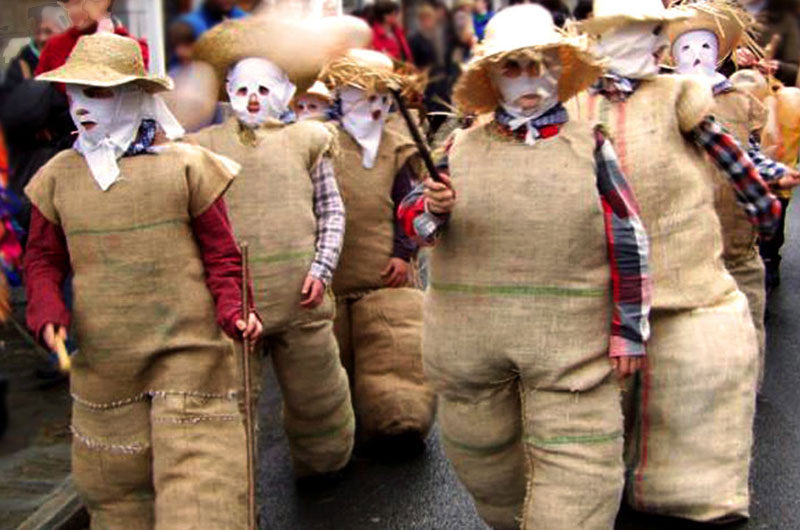

The Basque Country, is a region known for its vibrant culture, unique language, and rich history. However, it’s also home to some of the most fascinating and unusual traditions in Europe. In this article, we’ll explore five unusual Basque traditions that have captivated both locals and visitors alike.
Basque Carnival, known as “Inauteriak,” is an exceptional and distinctive celebration. While the rest of the world associates carnivals with colourful costumes and elaborate parades, the Basque Carnival is marked by rural and pagan elements. Villagers dress in traditional clothing, and the festival includes bull runs, processions, and feasting. One of the most unusual aspects of this carnival is the participation of “Joaldunak,” villagers dressed as mythical creatures with oversized cowbells attached to their backs. The ringing of these bells wards off evil spirits and usher in good luck for the coming year.

Pelota Vasca, or simply “pelota,” is a traditional Basque sport that dates back centuries. It’s a high-speed ball game played in various forms, including handball, paddle, and jai alai. The sport combines elements of tennis and racquetball and demands incredible dexterity and reflexes. What makes pelota truly unusual is its sheer intensity, with players launching a solid rubber ball at speeds exceeding 180 miles per hour. It’s a sport that leaves spectators awestruck, as the players engage in lightning-quick rallies, making it an exhilarating experience for all.
The rural Basque countryside is home to an extraordinary tradition known as stone lifting. Basque strongmen and women compete to lift heavy stones. Some weigh more than 200 kg, and are carried over long distances. The weightlifting competitions are a testament to physical strength. They also celebrate the Basque connection to the land. Stone lifting is a visually impressive and emotionally charged tradition. It speaks to the Basque people’s deep-seated pride in their rugged terrain and farming heritage.
Basque cider houses, known as “sagardotegiak” in the Basque language, are a distinctive culinary experience. These rustic establishments open their doors to visitors during the cider season, which typically runs from January to April. Guests are welcomed for a communal celebration. Here they can enjoy a hearty meal, freshly poured cider, and music. Cider is served from wooden barrels. The flavour is enhanced by aerating it by pouring it from height. It’s an unusual yet delightful tradition that allows guests to immerse themselves in the region’s culture and history.
San Juan de Gaztelugatxe is a breathtaking islet located off the Basque coast. On top is a chapel dedicated to Saint John. The tradition here is both unusual and visually striking. Visitors who make the arduous trek to the island must ring the bell at the chapel’s entrance three times and make a wish. This tradition dates back centuries and is believed to grant the wishes of those who partake. The panoramic views of the rugged coastline and the iconic stone bridge leading to the chapel only add to the unique experience.
In conclusion, the Basque Country is a land of unique and intriguing traditions, passed down through generations. Whether its the intense sport of pelota, the rustic charm of cider houses, or the mystical aura of San Juan de Gaztelugatxe, the Basque traditions offer a glimpse into a culture that’s both proud of its heritage and wonderfully enigmatic. These unusual customs add to the mystique of this remarkable region. They help make it a destination where history, culture, and adventure converge in an unforgettable way. Experience these unusual Basque traditions for yourself and become part of the story that is the Basque Country.